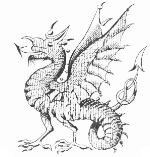

Fearful... fiery Drakes, and Blazing bearded-light,
Which frights the World.
--Guillim, Heraldry (1660)
The beast shown above is a dragon, or drake, of the particular variety called a wyvern.
drake: a dragon. For etymology, see below.
drake: a male duck, from north and central German dialect, draak, drake, drache; compare Old High German antrahho, antrehho.
By the way, the drakes referred to in the quotation are lightning bolts. Remember the simple rule: Lightning bolts are like fire, so they're named after dragons; stones skipping on the water are skipping on the water, so they're named after ducks.
Were they related? Probably, though they were not always on the best of terms. It may be inferred that Sir Francis, a nobody with no notable antecedents, was related to Sir Barnard's old county family in some way that no one wanted to make too much noise about. In fact, when Francis wanted to buy a house from a gentleman who was strapped for cash, he had to go through an intermediary to cover up his identity. He may, of course, be said to have had the last laugh. Apart from the small matter of immortal fame, that house which he bought with the profits from plundering the Spanish was a deconsecrated abbey north of Plymouth (now a National Trust property open to the public) that's far more impressive than the old Drake residence near Mount Drake in the other end of Devonshire. (Actually, the latter was reconstructed after being burned down in the Civil War. I give no details on how to find it because the present owner is decidedly publicity-shy.)
The Romans picked up the word draco. Eventually it was Anglicized to drake and gallicized to dragon. (Why did my fingers capitalize one of those verbs and not the other? Must be sheer chauvinism.)
Then somebody invented a firearm that spewed enough flame to earn the name dragon, which became dragoon, which came to be applied to the soldiers who used those arms.
Then Louis XIV (himself known as the Dragon, by the way) used his dragoons to pressure the Huguenots into converting to Catholicism. (Better than massacring them, after all, thus showing the rapid progress of civilization in France.) But anyway, when they had been dragooned into submission, the verb passed into English.
government: Those who are skeptical about this good news will please submit a 20,000-word essay on the high state of civilization attained in Sicily and the Appalachian mountains through the use of vendetta.
Copyright (C) 1997 Daniel Drake. A royalty-free license to reproduce this document in whole or in part is hereby granted provided (i) all additions, omissions, and other changes are clearly marked; (ii) the work is not reproduced as, or as part of, a work for which payment is charged; (iii) this notice is reproduced without change. Quotations for critical or polemical purposes, with proper attribution, are permitted in any case, being obviously fair use.
Document: http://www.dandrake.com/drake.html